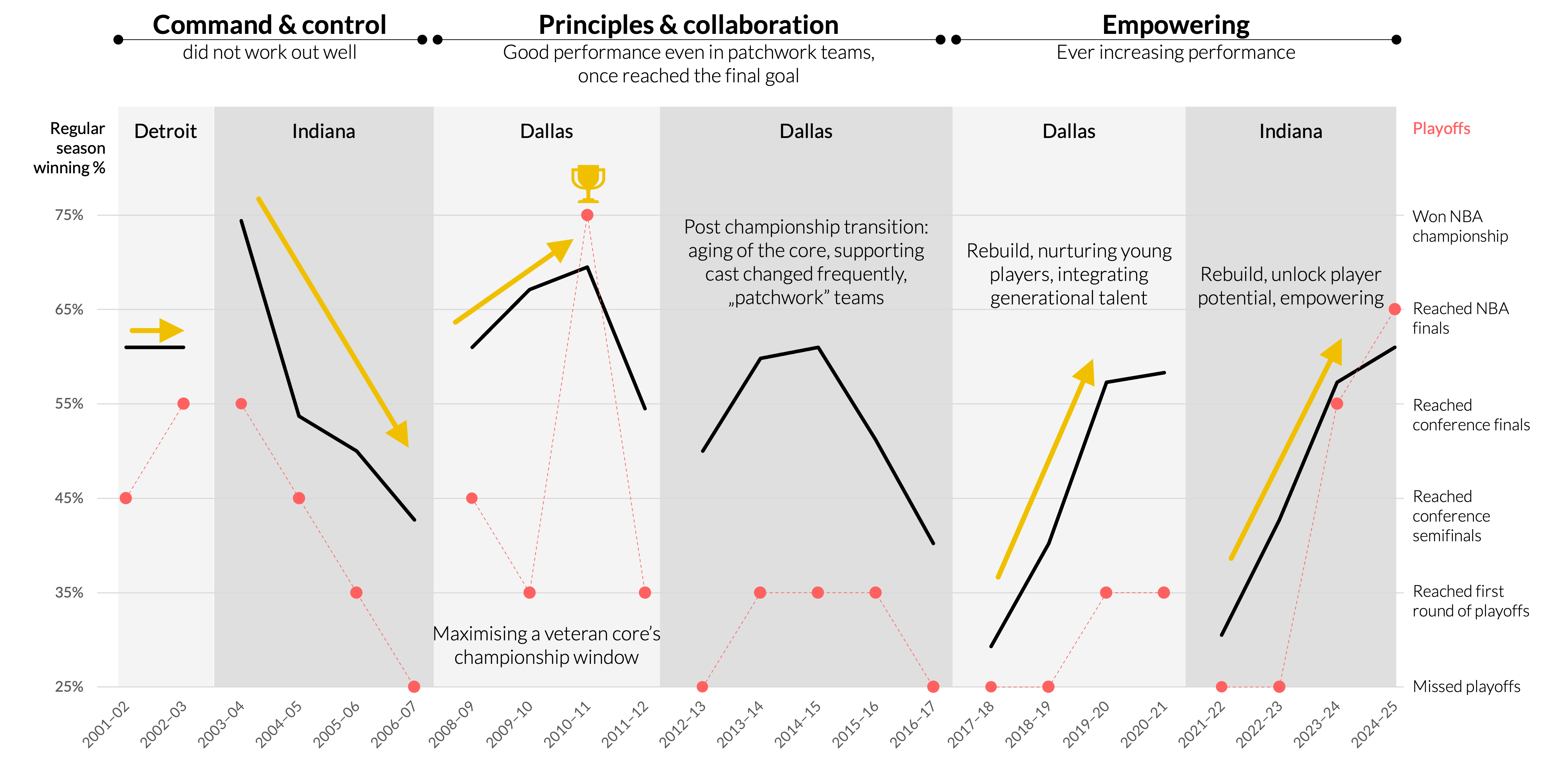
Like realising that the Earth is not flat. There are lots of proof points, though many still ignore it. Let’s see data based evidence that empowerment matters and makes a difference.
Rick Carlisle has undergone a remarkable transformation as a leader during his more than two decades as an NBA head coach. While his tactical brilliance has remained a constant, his approach to leadership, communication, and player relationships has evolved significantly. His journey shows great evidence of how the empowering leadership culture pays off.
When Carlisle first stepped into a head coaching role with the Detroit Pistons in 2001, he arrived with a clear leadership identity that would define his early career.
In his early coaching days, he was known primarily as a tactician rather than an emotional leader. He inspired his team through his deep knowledge of the game rather than through rousing speeches or emotional appeals. This cerebral approach established his credibility but came with certain limitations.
"Rick Carlisle is the Decider," noted a contemporary assessment of his leadership style. He was good at taking in information from various sources - assistants, players, owners - but the final decisions were unmistakably his. Though he was "exceptionally good at giving his key players the sense that they own a piece of the enterprise". This qualification hinted at leadership potential that would develop more fully over time.
Even during his first stint with the Indiana Pacers (2003-2007), Carlisle exhibited what many would characterise as a controlling leadership style. He was often "abrupt with his players, team management and the media" and developed a reputation as a "play-calling control freak". With teams more suited to deliberate play, he called almost every play from the sideline. His approach at this stage prioritised systems and structure over player autonomy.
Colleagues described the early Carlisle as "very intense," though they noted he "knows how to corral that sharpness and doesn't coach angry". This controlled intensity served him well tactically but potentially limited his ability to connect with players on a personal level.
Carlisle's thirteen seasons with the Dallas Mavericks (2008-2021) made a significant evolution in his leadership approach, catalysed by specific circumstances and relationships.
A pivotal moment in Carlisle's leadership development came during his first season in Dallas. The Mavericks had gotten off to a slow start, and Carlisle faced a choice about whether to maintain his controlling approach or adapt to his personnel.
Carlisle stopped micromanaging from the bench in the late aughts, realising that Jason Kidd, the point guard of the team, could process what was happening and what to do about it, just as fast and accurately as Carlisle could, he let his point guard run the show. This decision reflected the willingness to adapt his approach to fit the team's needs, and also represented a crucial step in Carlisle's growth as a leader, recognising when delegation could produce better results than direct control.
During this period, Carlisle moved away from rigid structures toward more flexible principles. While he had previously been known for tightly structured offenses, in Dallas his approach became more about "find the right shot at the right time for the right guy".
This philosophical shift represented a deeper change in leadership approach - from controlling processes to establishing guiding principles and trusting others to execute them. Carlisle also implemented a "groom everybody to be a head coach" ethos, requiring e.g. video coordinators to analyse games through a head coach's lens.
The evolution culminated in the Mavericks' 2011 championship run, where Carlisle's strategic flexibility proved decisive in defeating the heavily favored Miami Heat.
Carlisle's return to the Indiana Pacers in 2021 has revealed the fullest expression of his leadership evolution, showcasing how his approach has matured over two decades.
While Carlisle remains demanding and assertive - "Oh, he's gonna bark a little bit," as center Myles Turner puts it - he has fundamentally transformed his leadership approach. Carlisle has learned that collaboration is a lot easier to navigate than confrontation.
This shift is evident in how he now works with his coaching staff, empowering them much as Larry Bird once empowered him. Rather than insisting on control of every aspect of the team, he now "makes CEO decisions" while delegating important responsibilities, like offensive/defensive schemes to assistants, fostering ownership across the organisation.
Let’s take a look at the performance and results Carlisle achieved throughout his coaching career in light of the leadership styles he represented.

Data clearly show that as Carlisle has become a more mature leader, his latter teams have constantly developed. He understands that in spite of being the master of your profession, you need to become a better person in general to become a better professional and leader. Let’s see how he does that.
During the years, Carlisle developed individually by getting to know different areas of interest, ones that have direct links to his professional life and others that have indirect.
He has worked to bridge generational gaps in communication styles. He understands how players today communicate differently, influenced by social media, and credits having a 21-year-old daughter with teaching him how to connect with this generation. This willingness to adapt his communication style demonstrates emotional intelligence and leadership flexibility that wasn't as evident earlier in his career.
He's cultivated interests outside basketball, including becoming an accomplished pianist and licensed pilot, which have helped him connect with players in new ways. Flying lessons with players helped him demonstrate how small adjustments normalise situations, which metaphorically applies to game management. His piano mastery (inspired by Oscar Peterson) reinforces pattern recognition crucial for play design.
This broader perspective has influenced how he views player development. Turner notes that Carlisle has "adopted a more Zen approach" and is "less reactive" than in past years. Importantly, Turner observes, "he's striving to build young men, taking pride in that" - suggesting a leadership vision that extends beyond basketball performance to holistic development.
Carlisle's growth in understanding player psychology transformed him from a detached tactician to a relationship-driven leader. His “see the cans not just the can'ts" philosophy maximises role players' strengths. He revived J.J. Barea's career during the 2011 Finals by exploiting mismatches against LeBron James, showcasing emotional intelligence to build confidence in marginalised contributors. Myles Turner attests: "He's the first coach I've had with uninterrupted belief in my abilities".
Carlisle’s empowerment philosophy produced eight NBA head coaches from his staffs, and this leadership tree is creating a legacy beyond wins.
Carlisle's evolution is also evident in his long-standing role as President of the National Basketball Coaches Association, a position he has held for nearly two decades.
In this role, Carlisle has been intentional in raising the profile of young coaches and coaches of color. He is quick and vehement in his public statements when yet another seemingly successful head coach is let go, in an increasingly impatient league.
This advocacy demonstrates how his leadership philosophy has expanded beyond his immediate team to embrace the broader coaching profession. His efforts to establish the Lifetime Achievement Award for coaching excellence, named after Chuck Daly, further illustrate his commitment to celebrating leadership excellence in the profession.
"A lot's changed in 23 years," Carlisle reflected. "The game's evolved significantly. Sometimes my teams have led this evolution, while at other times we've had to adapt. One crucial lesson is the necessity of being open to change". His approach suggests that even after more than two decades as a head coach, he views leadership development as an ongoing process rather than a destination.
He navigated each era’s demands, from empowering veterans for a title run, to overachieving with patchwork rosters, to developing youth. Also, to evolve his leadership style in response to shifting NBA dynamics, he integrates modern analytics while maintaining core basketball tenets.
Rick Carlisle's journey from a controlling tactician to a collaborative leader is a masterclass in how cultivating emotional intelligence to connect with others, embracing collaborative delegation, fostering holistic development in those you lead, and a commitment to continuous growth can lead to sustained success and a lasting legacy.
He is the all-time winningest coach for both the Dallas Mavericks and Indiana Pacers. He is now among the NBA’s all-time leaders in both regular-season and playoff coaching wins.




